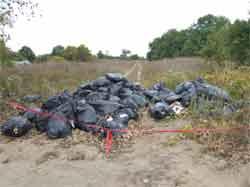 By Eric Freedman
Great Lakes Echo
By Eric Freedman
Great Lakes Echo
A federal appeals court has upheld a 10-year prison term for an Illinois sprinkler contractor who hired untrained workers to illegally remove asbestos without protective equipment and then arranged to dump the contaminated material.
Prosecutors presented sufficient evidence to the jury that Duane “Butch” O’Malley knowingly violated the Clean Air Act by removing, transporting and dumping insulation containing asbestos, the U.S. 7th Circuit Court of Appeals unanimously ruled.
Researchers have linked asbestos to such serious health risks as asbestosis, nonmalignant lung disorders, lung cancer and mesothelioma.
According to legal documents, real estate developer Michael Pinski bought a Kankakee, Ill., warehouse that contained asbestos-containing insulationwrapped around pipes. Kankakee is about 60 miles south of Chicago.
In 2009, Pinski hired O’Malley’s company to revamp the warehouse’s sprinkler system.
O’Malley also offered to remove the insulation and properly dispose of it for an additional $12,000 cash and with no written contract. The price was “substantially less than a trained asbestos abatement contractor would have charged to perform the work,” the U.S. Attorney’s office said in a press release.
O’Malley and the company weren’t licensed to remove asbestos and had no employees trained in complying with federal asbestos regulations, the court said.

Unlabeled trash bags containing asbestos-contaminated insulation that were illegally dumped in remote spots on Duane O’Malley’s orders. Image: Environmental Protection Agency.
“Almost everyone in the cast of characters recognized the asbestos for what it was,” including employees who recognized the asbestos, appeals Judge John Tinder wrote in the decision.
O’Malley hired Jeff Franc, who recruited three workers who used a circular saw and other gear that O’Malley supplied to strip dry asbestos insulation off the pipes.
“O’Malley did not hire anyone with training in asbestos removal, nor did he train Franc and his workers in the proper way to remove asbestos,” Tinder said. “He did not make available water or equipment for wetting the asbestos. Predictably, the circular saw produced large amounts of asbestos dust that filled the room.
“The workers were equipped only with a few paint suits, simple dust masks and useless respirators with missing filters. The workers donned the dust masks initially, but they quickly became clogged and the workers were unable to breathe through them,” the decision said.
After the crew stopped working because the dust made them ill, O’Malley failed to notify federal or Illinois environmental agencies of the asbestos problem.
As for the discarded insulation, it was stuffed into more than 100 unlabeled plastic trash bags and dumped at an abandoned farmhouse, a Dumpster next to a Hobby Lobby and at the end of a street near an empty house, testimony showed.
When authorities found the material, the Environmental Protection Agency hired Superfund contractors who spent more than $47,000 to properly get rid of the asbestos and clean up contaminated soil.
An O’Malley employee cooperating with EPA criminal investigators recorded phone calls in which O’Malley coached him to “mislead federal agents if asked further about the asbestos removal and disposal. O’Malley also came up with the clever scheme to pin the illegal asbestos removal on Franc,” who headed the work crew, the court said.
Developer Pinski pled guilty to violating the Clean Air Act and received a one-year sentence. An O’Malley employee who pled guilty received a six-month jail sentence.
A jury convicted O’Malley, who was sentenced to prison, fined $15,000 and ordered to pay the EPA more than $47,000 in restitution.
In affirming the conviction, the appeals court said prosecutors proved that O’Malley “was knowingly working with asbestos-containing material” covered by the Clean Air Act, and the jury “was convinced beyond a reasonable doubt that O’Malley knew the insulation contained asbestos.”
At the time of sentencing, U.S. Attorney Jim Lewis issued a statement saying. “To increase his profits, a jury found that O’Malley knowingly disregarded federal environmental laws that require asbestos containing materials be safely removed and properly disposed. Today’s sentence is a consequence of the defendant’s flagrant disregard for his workers, the public and the environment in exposing them to dangerous airborne asbestos fibers.”
O’Malley is incarcerated at a low-security prison in Lisbon, Ohio, U.S. Bureau of Prisons records show. The other two defendants have finished their prison terms.